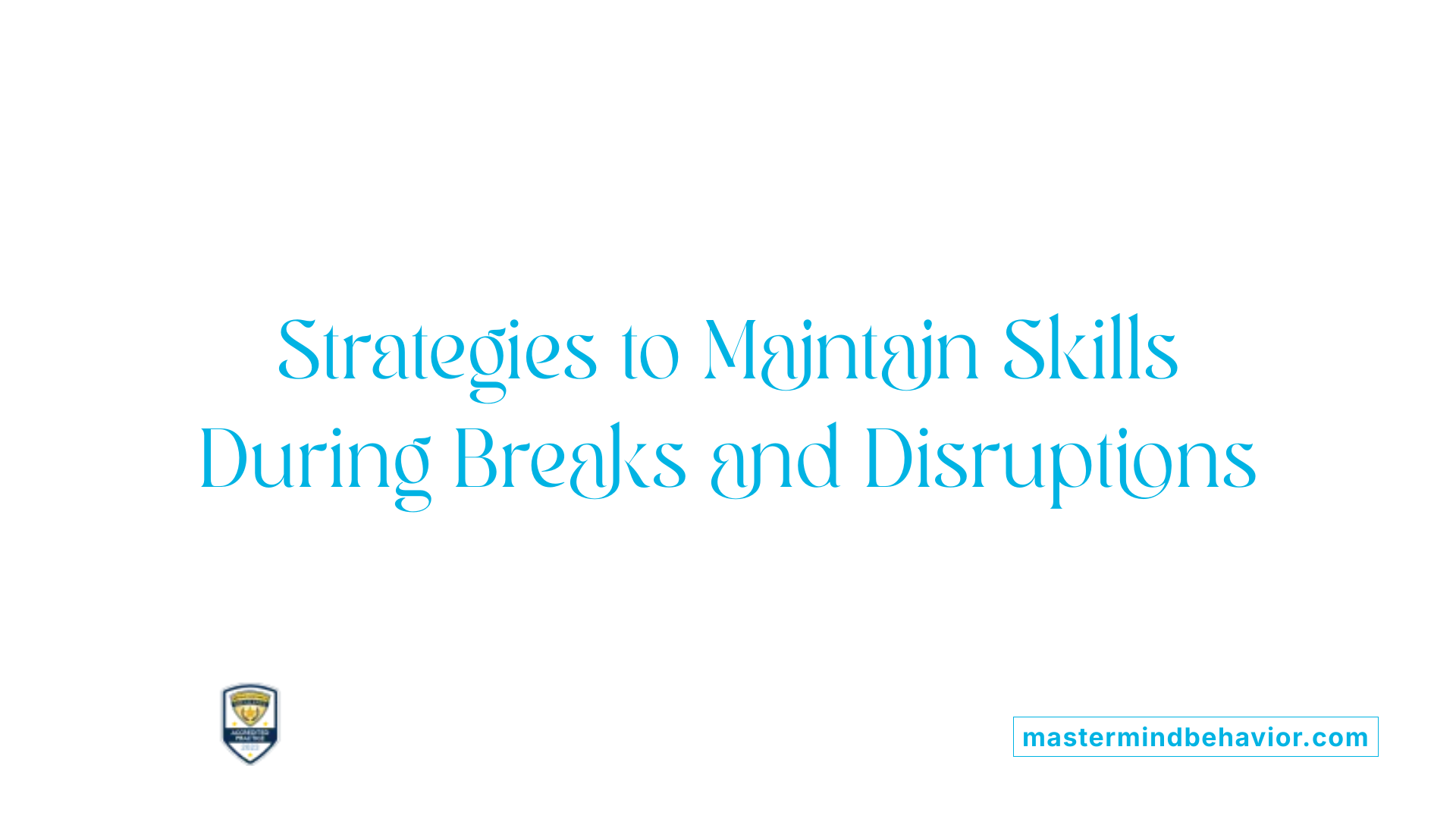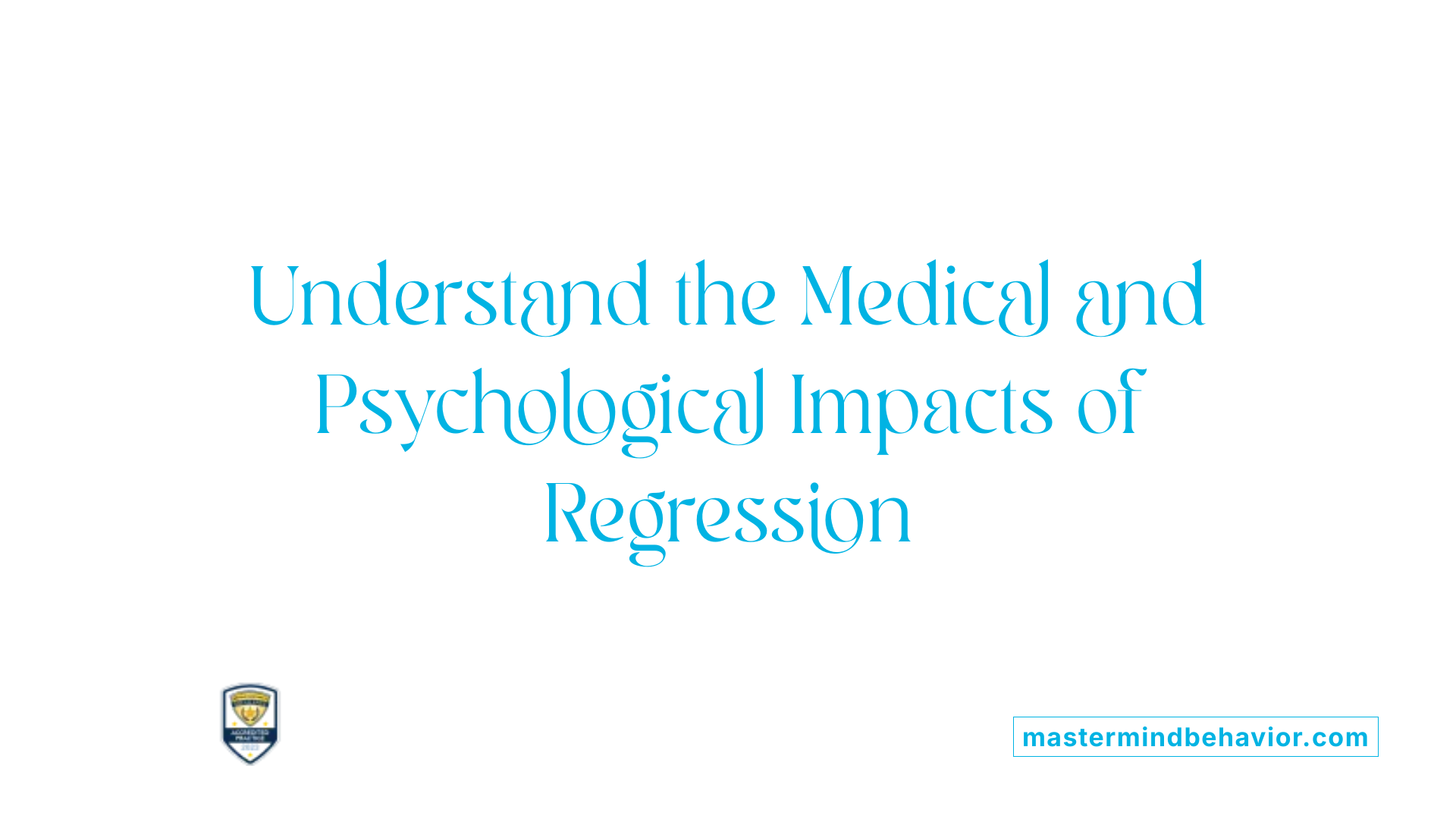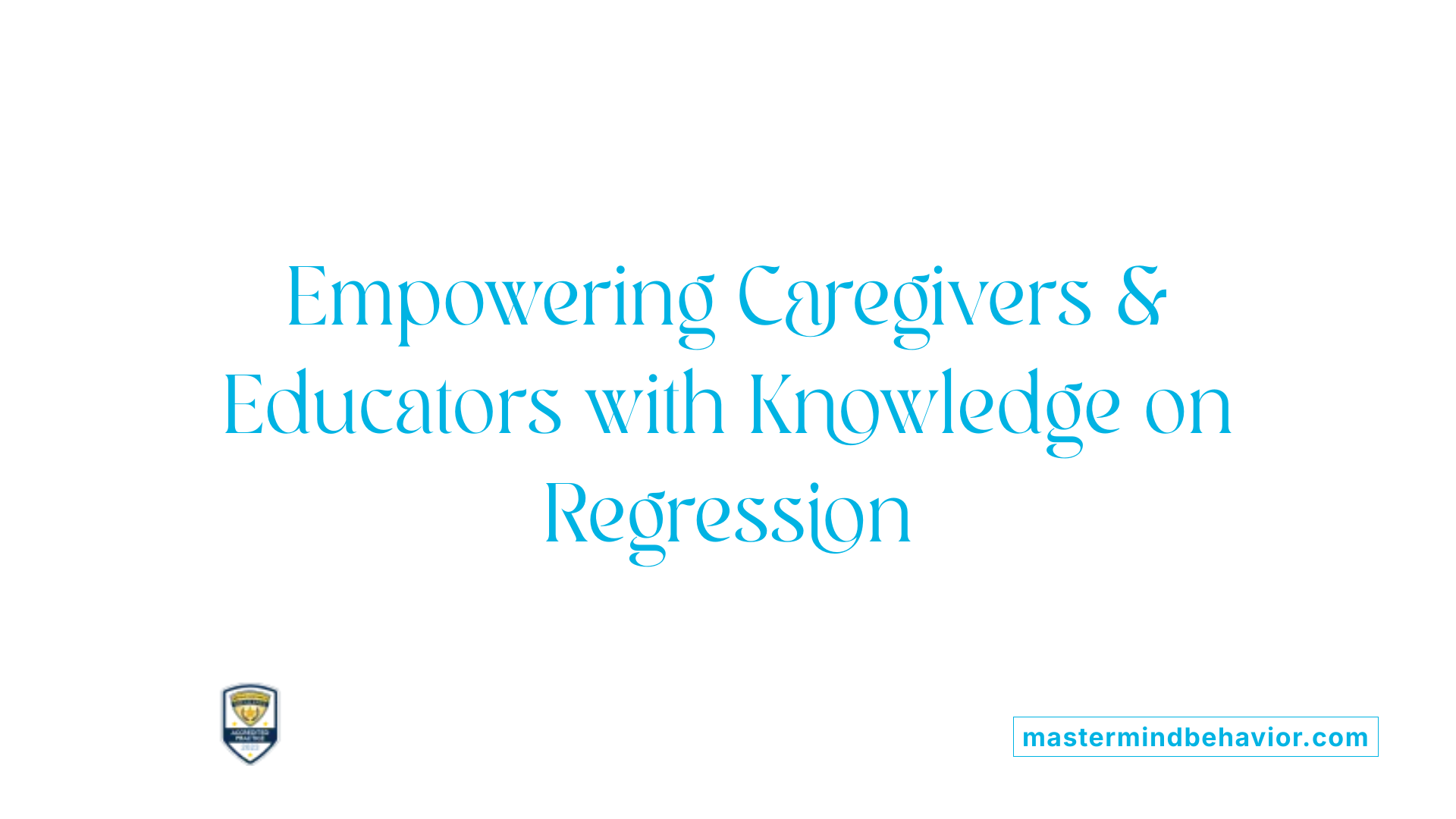Understanding Skill Regression and Its Complexities
Skill regression, the temporary or long-term return to earlier developmental stages or loss of acquired abilities, can be distressing for caregivers, educators, and individuals alike. Whether occurring in children or adults, regression often results from stress, trauma, neurological conditions, or environmental changes. Recognizing the signs and causes of regression is crucial for timely intervention and support, ensuring that individuals can regain their skills and continue meaningful development.
Recognizing Signs and Causes of Skill Regression in Children
What are the signs and causes of skill regression in children?
Skill regression in children can present through various signs, such as the loss of language abilities, decreased social interactions, decline in motor skills like walking or grasping, and challenges in self-care tasks such as dressing or feeding. Children might become less responsive, withdraw from social settings, or revert to earlier behaviors like whining or tantrums.
The causes of regression are diverse. Developmental disorders like autism spectrum disorder often feature skill loss as a core symptom. Genetic conditions, such as Rett syndrome, lead to progressive regression typically starting in early childhood. Neurodegenerative diseases and metabolic disorders can also impair neurological function, resulting in regression. Moreover, environmental stressors — including traumatic events, significant routine changes, or emotional disturbances — impact brain function and can trigger regression.
Stress and emotional factors play a critical role. When a child's brain experiences heightened stress or trauma, areas responsible for regulation, memory, and decision-making may be affected, leading to temporary or persistent skill loss. Physical health issues, such as seizures or metabolic imbalances, contribute as well, necessitating comprehensive medical evaluation.
Early detection involves careful observation of developmental milestones and behavioral changes. If signs of regression are noticed, prompt consultation with healthcare providers ensures appropriate diagnosis through history-taking, physical examinations, and relevant tests like blood work, MRI scans, or hearing assessments. Addressing underlying medical or psychological issues early allows for targeted therapies, medical management, and support systems to aid in the child's development and emotional well-being.
| Signs of Regression | Possible Causes | Diagnostic Considerations |
|---|---|---|
| Loss of speech or language skills | Autism, Rett syndrome, neurodegeneration | Developmental history, neurological tests |
| Withdrawal from social interactions | Autism, trauma | Physical exam, psychological assessment |
| Decline in motor coordination | Genetic disorders, metabolic issues | MRI, metabolic panels |
| Self-care skill deterioration | Multiple conditions, emotional distress | Comprehensive medical evaluation |
Prevention of Skill Regression During Breaks and Disruptions
 During school breaks, summer programs, or unexpected disruptions, children and students with learning differences are at risk of experiencing skill regression—where previously mastered skills fade or diminish temporarily. To prevent this, caregivers and educators can adopt several effective strategies.
During school breaks, summer programs, or unexpected disruptions, children and students with learning differences are at risk of experiencing skill regression—where previously mastered skills fade or diminish temporarily. To prevent this, caregivers and educators can adopt several effective strategies.
First, maintaining consistent routines provides stability that helps children feel secure and supports ongoing learning. Incorporating structured daily schedules that mirror school activities ensures continuity in behavioral and academic skills.
Engaging activities are vital for keeping skills intact. Reading books, journaling, and practical tasks like calculating bills or following recipes help reinforce cognitive and functional abilities. Creative and hands-on activities also promote problem-solving and fine motor skills.
Facilitating social interaction is another important aspect. Tutoring sessions, educational camps, or using digital applications enable children to practice social skills and engage in developmental challenges in fun, motivating ways.
Monitoring progress is essential to identify early signs of regression. Regular check-ins, assessments, and open communication with children help adults adjust supports when needed. Collaborating with schools, therapists, and specialists ensures that intervention plans are personalized, covering therapies, extended school year options, or summer programs designed specifically for maintaining skills.
Supporting a child's emotional well-being fosters motivation and confidence. Validating feelings, providing reassurance, and celebrating progress help children remain positive about their abilities.
Implementing these strategies through a tailored, collaborative approach minimizes the risk of learning and social skill setbacks during breaks, helping children sustain their development and confidence effectively.
Maintaining and Reinforcing Skills Over Time

What guidance exists for maintaining and reinforcing learned skills over time?
To keep skills sharp and ensure long-term retention, it is vital to practice regularly and apply what has been learned actively. Repetition strengthens neural pathways, making skills more automatic and easier to recall.
Incorporating hands-on experiences like shadowing professionals, mentoring, volunteering, or engaging in real-world projects helps solidify skills through practical application. These activities add context and relevance, making learning more meaningful and easier to internalize.
Techniques such as spaced repetition—reviewing information at increasing intervals—help embed skills into long-term memory. Retrieval practice, or actively recalling information rather than passively reviewing, also enhances retention. Using multiple sensory modalities (visual, auditory, kinesthetic) through multisensory learning further supports long-lasting learning.
Setting clear, achievable goals and continuously tracking progress through feedback and documentation motivates learners and highlights areas for improvement. Creating engaging learning environments—such as interactive workshops, gamified activities, or customized content—keeps learners interested and motivated.
Diversifying reinforcement strategies, like offering praise, rewards, or varied challenges, helps maintain enthusiasm. Encouraging reflection on learning experiences fosters deeper understanding and personal motivation.
By consistently combining practice, experiential learning, targeted techniques, goal-setting, environment design, and motivation, learners can effectively reinforce and sustain their skills over time, preventing regression and promoting ongoing growth.
Supporting Individuals with Skill Regression
How can regression be identified and addressed?
Recognizing signs of skill regression involves noticing when a person, especially a child, begins to lose skills they previously mastered. These can include reverting to earlier behaviors such as temper tantrums, difficulty sleeping or eating, or abandoning routines like dressing or talking in immature ways. Addressing regression starts with identifying potential underlying causes like stress, illness, burnout, or environmental changes.
Consulting healthcare professionals—including pediatricians, neurologists, or mental health experts—is crucial to pinpoint medical or psychological factors contributing to regression. Developing a supportive environment involves routine adjustments to reduce sensory overload, such as creating calm, predictable daily schedules that foster emotional stability.
Supporting emotional regulation is fundamental. Caregivers should provide reassurance, engage in soothing activities, and create a safe space where individuals can express feelings. Using visual aids like picture schedules and clear routines can help the individual understand expectations and regain confidence.
Furthermore, positive reinforcement encourages the return to the desired skills. Tailored interventions, including play-based therapies and symbolic play, can help children articulate feelings and rebuild skills. It’s also important to document regression signs to monitor progress and adapt support strategies accordingly.
Collaboration with educational and health professionals enables the development of individualized plans. Continuous observation and accurate record-keeping inform necessary adjustments, ensuring the person’s safety, emotional well-being, and progress toward recovery.
| Strategies | Techniques | Additional Support |
|---|---|---|
| Identifying causes | Medical consultation, environmental assessment | Regular monitoring and documentation |
| Emotional regulation | Routine adjustment, sensory management, reassurance | Therapy and behavioral interventions |
| Skill reinforcement | Visual aids, structured routines, positive reinforcement | Collaboration with professionals |
| Support planning | Personalized strategies, multidisciplinary teamwork | Continuous review and adaptation |
Effective management involves understanding each individual's needs and circumstances, and tailoring support to promote resilience and skill regaining.
Recognizing and Addressing Developmental Regression and Its Implications

How can one recognize developmental regression and understand its medical or psychological implications?
Developmental regression occurs when a child loses skills they previously acquired, such as speech, social responsiveness, motor abilities, or cognitive functions. Typically, it manifests between 18 and 24 months of age, a critical period for developmental milestones.
Signs of regression include a child who once spoke words but now is less verbal, or who once played interactively but now withdraws or shows less interest in social activities. Some children might revert to earlier behaviors, such as regressive speech or losing interest in self-care routines.
Regression is particularly associated with conditions like autism spectrum disorder, Rett syndrome, and Phelan McDermid syndrome. In these conditions, regression can be partial or complete and may occur suddenly or gradually over time.
Diagnosing regression involves a thorough assessment, which includes detailed developmental history, behavioral observations, and medical testing. Healthcare providers might use tools like EEGs to check brain activity or genetic tests to identify underlying syndromes.
Understanding the implications of regression is vital. It often indicates a worsening or complication of a child's condition, leading to delays in development and increased severity of symptoms. It can also emotionally impact caregivers, who may feel stress, frustration, or grief.
Early recognition and intervention are essential. Therapies such as speech therapy, occupational therapy, and behavioral interventions can help regain lost skills and support overall development. Prompt action can significantly improve prognosis and help families navigate these challenging situations more effectively.
Interventions to Counteract or Minimize Skill Loss
What interventions are effective in counteracting or minimizing skill loss?
Addressing skill regression requires a personalized approach that considers the individual's specific needs and circumstances. Effective strategies include behavioral interventions, environmental modifications, and, in some cases, medication.
Behavioral strategies focus on reinforcing desired skills through consistent routines and positive reinforcement. Techniques like breaking complex tasks into manageable steps and using visual aids have been proven to help individuals, especially those with attention or learning challenges, retain and develop skills.
Environmental modifications involve reducing stressors and creating supportive settings. For example, minimizing noise and chaos helps individuals with sensory sensitivities or executive function difficulties maintain their skills and avoid overload.
Pharmacological options may be necessary for managing underlying conditions contributing to regression, such as ADHD or mood disorders. Medications like antidepressants, benzodiazepines, or antipsychotics are employed under professional supervision.
Early intervention is particularly critical in cases like ADHD, where developing routines and organizational skills can prevent or reduce regression. Techniques such as breaking tasks into smaller steps, establishing visual cues, and creating consistent daily routines provide structure that supports skill maintenance.
Addressing underlying causes—like emotional overload, stress, or environmental disruptions—is essential. Strategies such as stress management, healthy lifestyle habits, and targeted skill practice can lower the risk of regression.
Collaboration with healthcare professionals—therapists, teachers, neurologists, and psychologists—is vital. Professionals can conduct functional behavior assessments, collect data, and tailor intervention plans that include therapies, behavioral supports, and educational accommodations.
Finally, building routines focused on successes nurtures confidence and motivation, helping individuals recover and strengthen lost skills. Emphasizing gradual progress and positive reinforcement can foster resilience against future regressions.
Educating Caregivers and Professionals about Regression

How can caregivers, parents, and educators be educated about regression?
Educating those who care for children about regression involves providing accessible, comprehensive resources that explain what regression is, why it happens, and how to support children through it. Various mediums such as websites, books, workshops, and professional training programs are useful tools for spreading this knowledge.
Training should focus on helping caregivers recognize the signs of regression, which can range from temper tantrums and mood changes to loss of acquired skills such as speech, social interactions, or self-care abilities. By understanding these signs, parents and teachers can respond with reassurance, patience, and emotional support.
Supporting children during regression also involves encouraging imaginative and symbolic play, which allows children to express their feelings safely. For example, using play to re-enact stressful situations or to explore feelings helps children process emotions and regain lost skills.
It is normal for children to regress during stressful times or developmental transitions, and making this clear helps reduce anxiety among caregivers. Explaining that regression is often temporary reassures parents and educators that the child's progress will likely resume.
Healthcare professionals, such as pediatricians and child psychologists, play a vital role by offering personalized advice, monitoring persistent regression, and guiding families toward specialized support if needed.
Finally, ongoing education about child development and stress management equips caregivers with the strategies to handle regression confidently. They learn to set realistic expectations, provide consistent routines, and create a supportive environment conducive to emotional and developmental growth.
Regular training updates ensure caregivers stay informed about new research and techniques for managing regression, ultimately fostering healthier outcomes for children experiencing these episodes.
Moving Forward with Compassion and Knowledge
Handling regression in learned skills demands a holistic approach rooted in understanding, early detection, and proactive support. Recognizing the signs—whether in children or adults—allows caregivers and professionals to implement tailored interventions that address underlying causes, reinforce skills, and promote psychological well-being. Equipping caregivers, educators, and healthcare providers with up-to-date knowledge and practical strategies fosters a supportive environment where individuals can recover and thrive despite setbacks. Emphasizing compassion, patience, and collaborative effort transforms challenges into opportunities for growth and resilience, ultimately ensuring sustained development and improved quality of life for those affected.
References
- 5 Strategies to Prevent Regression in Learning-Difference Students ...
- Regression: Diagnosis, Evaluation, and Management - PMC
- Child regression: What it is and how you can support your little one
- Developmental regression: when children lose skills
- Combating Skill Regression ADHD: Strategies for Success
- Regression: What Is It and How to Stop It - Verywell Mind
- Developmental regression in children: Current and future directions
- Developmental regression in children: Current and future directions
- Developmental regression: when children lose skills
- Child Developmental Regression & What To Do About It








